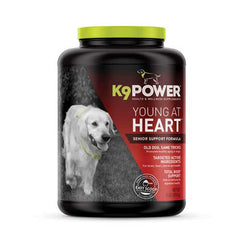Vitamin E - Benefits For Your Dog
Vitamin E sounds like something you should add to your dog’s food dish, but why? Many of us are already familiar with the vitamin, seeing it on the labels of skin products we use each day. It's great for our skin, our hair, our nails, our immunity. It's often positioned as playing an essential role in their overall health and well-being.
Turns out, it’s great for our pups, too.
Why Should I Give My Dog Vitamin E?
This fat-soluble vitamin and antioxidant helps protect and defend the body against free radicals, boosts their immune system, and nourishes their heart, liver, nerve cell membranes and muscles.
Let’s unpack those free radicals first. According to Dr. Jennifer Coates, an accomplished writer, editor, and veterinarian, free radicals are “a group of atoms containing oxygen and electrons that can damage cell membranes, proteins, DNA and other parts of the body.” Our dogs normally create these as they metabolize food (convert it to energy), this can accelerate during sickness or with age. Free radicals cause damage because they basically “steal” electrons from other atoms and molecules in the body. This can have a snowball effect, injuring cells and causing the body to break down quicker.
Antioxidants, on the other hand, “donate” electrons to free radicals, neutralizing them. This can help prolong the health of various body systems, foster growth, and bolster immunity.
Vitamin E also plays other roles in the body, like forming cell membranes. This is how the vitamin can lend support to our dogs’ skin. Since healthy skin, in turn, creates a healthy coat, adding Vitamin E to their diet can provide a boost of shine to their locks.
Vitamin E Deficiency
An early sign that your dog may be deficient in Vitamin E is in their skin and coat. Dryness, itching, flaking and rashes may all occur when missing this nutrient.
Additionally, if your dog is suffering from flea allergy dermatitis, a deficiency of Vitamin E can make it worse by increasing side effects, like skin lesions and inflamed skin. Vitamin E is a top-recommended vitamin to give your dog by many vets, helping your pup recover from common skin ailments. They recognize its high anti-inflammatory properties and its potential to soothe and restore skin health.
While rarer, more extreme Vitamin E deficiencies can lead to trouble with vision, neurological problems, reproductive impairments, and a weakened immune system.
So, where does this Vitamin E deficiency come from?
Dog food should contain a healthy balance of vitamins and nutrients your dog needs. That’s what dog food labels mean when they say, “complete and balanced.” However, sometimes the cooking process causes these vital nutrients to be compromised. Vitamin E molecules are delicate, making them particularly easy to destroy when cooking. Beyond that, not all forms of Vitamin E in commercial dog foods is equally bioavailable (able to be absorbed into the body). In any of these cases, your dog may risk becoming deficient.
How Much Vitamin E Do Dogs Need?
Dogs need a healthy dose of Vitamin E each day, just like we humans do. With proper, nutritionally-balanced dog food, supplements may not be necessary. Ultimately, this is a conversation (and decision) best had with your vet.
Some dogs with particularly dry or itchy skin can benefit from supplemental (additional) Vitamin E. Other times, skin and ear allergies demand an increase of the vitamin in their diet. We’ve formulated three powerful blends, Show Stopper, Total K9 and Young at Heart, to contain the perfect amount of Vitamin E for your dog.
We know that it’s not just the amount that matters when it comes to nutrients in food. Specifically how dog food and supplements are processed is critical, too. This is why we prepare K9 Power blends with a process that doesn’t destroy or compromise vital nutrients.
For smaller dogs or puppies below two years, 400 IU of vitamin E is the recommended daily amount. Large dogs above two years, 800 IU of vitamin E is enough to maintain good health. For sick dogs, dogs recovering from an illness, or dogs with more severe skin and coat issues, a higher daily allotment of Vitamin E more may be required, after consulting with your vet.
🐾🐾🐾🐾🐾
Final Thoughts
Vitamin E in dogs plays a crucial part in their overall health and well-being. This powerful vitamin delivers antioxidant and anti-inflammatory benefits. It also helps nourish vital organs and encourages healthy skin and coat growth.
If you have concerns about your dog’s Vitamin E levels, or if your vet lets you know they suffer from dry, itchy skin, or allergies, you should first turn to their food quality. After that, the single best way to ensure your dog is getting his vitamin E is through quality pet supplements.
Explore Our Products With Vitamin E

Shedding is inevitable, but excessive shedding doesn’t have to be. Promote healthy skin and coat with antioxidants and key nutrients for their skin and coat.

No matter what your dog’s typical day looks like, add a security blanket of nutrition to her day.

Age is just a number. Make their senior years as joyous as their first with nutritional support that keeps them feeling younger and healthier.







Leave a comment